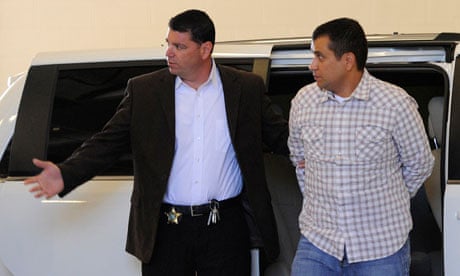George Zimmerman surrendered himself to authorities in Florida on Sunday, uncertain of his chances of regaining freedom before he goes on trial for the murder of Trayvon Martin.
The neighbourhood watch captain arrived at the Sanford County Jail shortly before the expiration of a 48-hour deadline to turn himself in, imposed by Judge Kenneth Lester Jr on Friday.
His legal team confirmed that Zimmerman was back in police custody in a tweet sent out at 1.38pm ET.
It was not immediately clear where he had surrendered.
Lester revoked Zimmerman's $150,000 bail after ruling that the defendant, who has been in hiding since his release from custody six weeks ago, had lied about money raised on a private website.
The state attorney prosecuting Zimmerman, 28, for the second-degree murder of the unarmed teenager during a confrontation in Sanford on February 26 insisted he had $135,000 in his defence fund, yet claimed at a bond hearing in April that he was penniless.
"Does your client get to sit there like a potted plant and lead the court down the primrose path?" an angry Lester asked Zimmerman's lawyer, Mark O'Mara, at Friday's hearing.
"He can't sit back and obtain the benefit of a lower bond based upon those material falsehoods."
Conversations from prison between Zimmerman and his wife Shellie also revealed the existence of a second US passport that he owned but did not surrender, leading prosecutors to state he was a flight risk.
Zimmerman will get the chance to tell his side of the story this week after Lester said he would schedule another hearing, possibly as early as Monday.
But while O'Mara is likely to plead for his client to be bailed once again, Lester has the option to order him to remain behind bars until his trial, which may not take place until next year.
Potentially more damaging is the hit to the defendant's credibility caused by being seen to lie to a judge. Zimmerman admits shooting and killing Martin, 17, as he walked through the Retreat at Twin Lakes gated community but has insisted that he acted in self-defence against an aggressor who broke his nose. Under Florida's controversial stand your grand law, the use of deadly force is justified in life-threatening situations.
Lawyers for Martin's family, however, question how his account of the incident can be believed if he was willing to deceive a court over his financial circumstances.
"Whatever dishonesty that comes forth by George Zimmerman that they can prove, you can best believe it will become the issue of this case," said Benjamin Crump, who represents Sybrina Fulton and Tracy Martin, the dead boy's parents.
Legal analysts agree it will be an issue at trial. "Basically, Zimmerman is going to be asking the jury to believe his version of the facts," former prosecutor Randy McLean, now an Orlando-based attorney, told the Associated Press.
"As the case stands now, his credibility is absolutely critical to the case."
McLean also pointed to O'Mara having waived his client's right to a speedy trial, a decision that might not prove favourable given that Zimmerman is back in jail.
